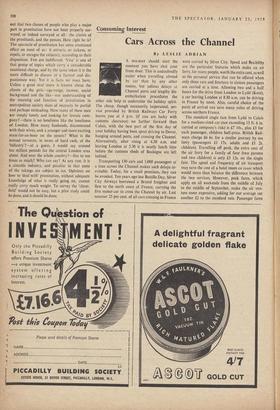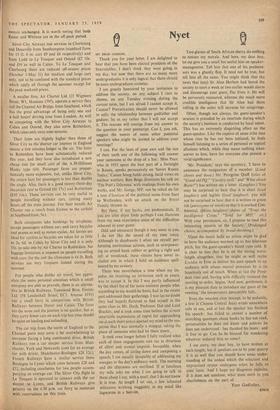Consuming Interest
Cars Across the Channel By LESLIE ADRIAN A HOLIDAY should start the moment you have shut your front door. This is undoubtedly easier when travelling abroad by car than by any other means, but tedious delays at Channel ports and lengthy dis- embarkation procedures the other side help to undermine the holiday spirit. The cheap, though necessarily impersonal, ser- vice provided by British Railways Car Ferry leaves you at 4 p.m. (if you are lucky with customs clearance) no farther forward than Calais, with the best part of the first day of your holiday having been spent driving to Dover, hanging around ports, and crossing the Channel. Alternatively, after rising at 4.30 a.m. and leaving London at 5.30 it is nearly lunch time before the customs sheds of Boulogne are left behind.
Transporting 130 cars and 1,000 passengers at a time across the Channel makes such delays in evitable. Today, for a small premium, they can• be avoided. Ten years ago last Bastille. Day, Silver City Airways borrowed a Bristol freighter and flew to the north coast of France, carrying the first motor-car to cross the Channel by air. Last summer 25 per cent. of all cars crossing to France were carried by Silver City. Speed and flexibility are the particular features which make an air ferry, for many people, worth the extra cost, as well as the personal service that can be offered when only three cars and fourteen to sixteen passengers are carried at a time. Allowing two and a half hours for the drive from London to Lydd (Kent), a car leaving London at 8.30 a.m. can be driving in France by noon. Also, careful choice of the point of arrival can save many miles of driving across northern France.
The standard single fare from Lydd to Calais for a medium-sized car (not exceeding 13 ft. 6 in. carried at company's risk) is £7 10s., plus £3 for each passenger, children half-price. British Rail- ways charge £6 6s. for a similar journey by sea ferry (passengers £1 17s. adults and £1 2s. children). Travelling off peak, the extra cost of the air ferry for a family of four (two parents and two children) is only £3 12s. on the single fare. The speed and frequency of air transport may save the cost of a hotel room en route which would more than balance the difference between the two services. However, peak fares, which apply on all weekends from the middle of July to the middle of September, make the air ven- ture more expensive, adding for our average car another £2 to the standard rate. Passenger fares remain unchanged. It is worth noting that both Easter and Whitsun are in the off-peak period.
Silver City Airways run services to Cherbourg and Deauville from Southampton (standard fares for 13 ft. 6 in. cars £9 and £6 respectively) and from Lydd to Le Touquet and Ostend (i7 10s. and £9) as well as Calais. To Le Touquet and Cherbourg there are reduced off-season prices (October 1-May 31) for medium and large cars only, not to be confused with the standard prices which apply all through the summer except for the peak weekend prices.
A smaller firm, Air Charter Ltd. (21 Wigmore Street, WI, Museum 1595), operate a service they call the Channel Air Bridge, from Southend, which has the great advantage of being only one and a half hours' driving time from London. As well as competing with the Silver City Airways to Calais and Ostend, they also serve Rotterdam, which takes only sixty-nine minutes.
Their fares are slightly higher than those of Silver City as the shorter car journey in England means a few minutes longer in the air. The fares to Rotterdam have been substantially reduced this year, and they have also introduced a new cheap rate for small cars of the A.30-Hillman Husky type (£4). Passenger fares are propor- tionately more expensive, but, Unlike Silver City, the return fare for passengers is less than double the single. Also, ther'e is a good twenty-three-day excursion rate to Ostend (£6 17s.) and Rotterdam (£10 14s.). These 'services can be very useful to People travelling without cars, cutting many hours off the train journey. For their benefit Air Charter run a coach from Euston to the airfield at Southend (cost, 5s.).
Both companies take bookings by telephone, accept passengers without cars and carry bicycles and prams as well as motor-cycles. Air ferries are ideal for cyclists as bicycles are taken for as little as 2s. 6d. to Calais by Silver City and it is only 10s. to take one by Air Charter to Rotterdam. No luggage limitation is imposed on people travelling with cars; for the rest the allowance is 44 lb. Both services are very frequent indeed during the summer.
For people who dislike air travel, but appre- ciate the more personal attention which a small company are able to provide, there is an alterna- tive to British Railways. Townsend Bros. Ferries Ltd. (78 Leadenhall Street, EC3, Avenue 4191) run a small ferry in competition with British Railways between Dover and Calais. The fares are the same and the journey is no quicker, but as they carry fewer cars on each trip less time should be spent on loading and unloading.
The car trip from the north of England to the Channel ports may seem a bit overwhelming to someone facing a long continental drive. British Railways run a 'car sleeper service from Man- chester, York and Newcastle (cost for an average car with driver, Manchester-Boulogne £26 12s.). French Railways have a similar service from Boulogne to Lyons which costs between £28 and £32,,including,couchettes for two people accom- panying an average car. The Silver City flight to Le Touquet is operated to connect with the car sleeper to Lyons, and British Railways give priority on the 4.30 p.m. car ferry to motorists with reservations on this train.











































 Previous page
Previous page